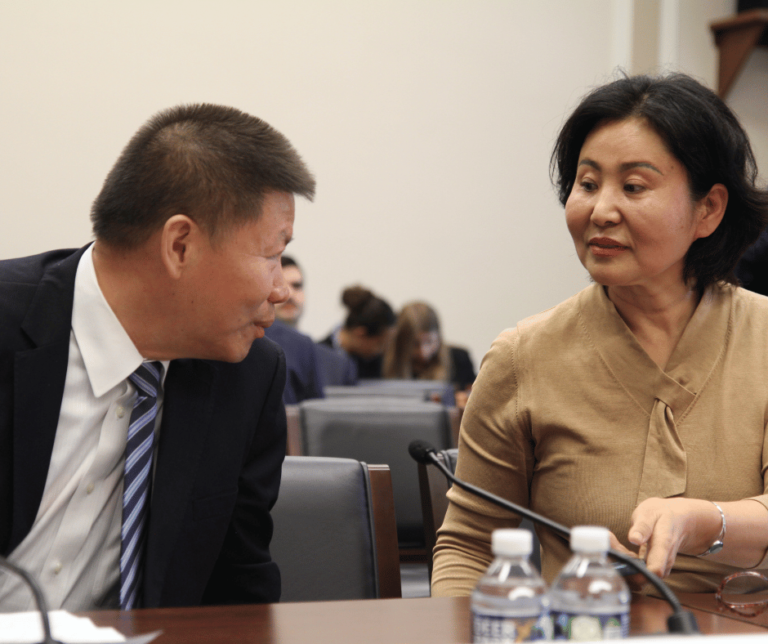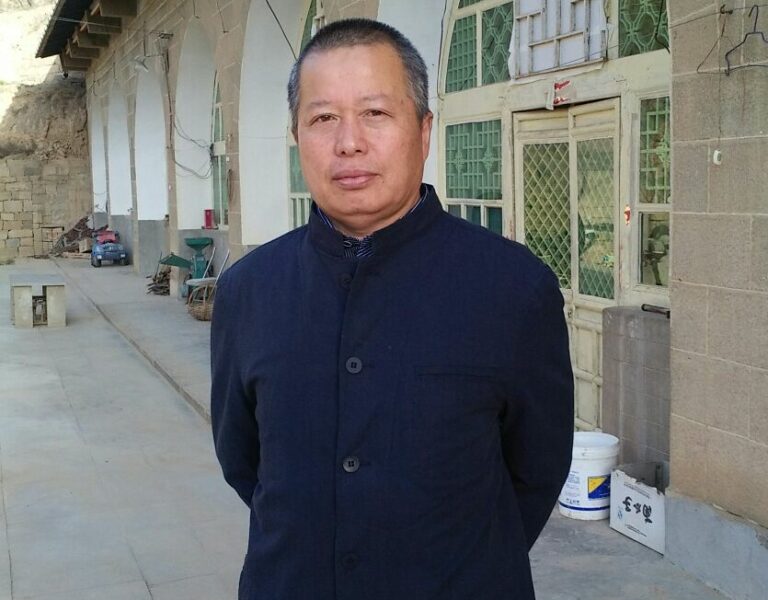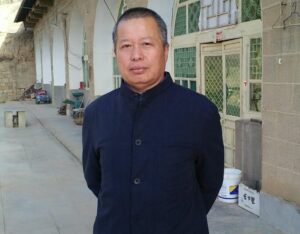(China) International organizations are calling for the release of Gao Zhisheng, a world-renowned human rights lawyer.
Gao defended house church Christians, Falun Gong practitioners, and other minorities from the clutches of the Chinese Communist Party (CCP). Unfortunately, his activism put a target on his back. No one has seen or heard from him in six years.
Forced disappearance
Many human rights lawyers and other oppressed groups are “forcibly disappeared” like Gao. The Communist Regime does not notify their families of the confinement and keeps their well-being hidden or obscure. Meanwhile, authorities brutally torture the imprisoned human rights lawyers in secret.
Today, other human rights groups signed an open letter, calling upon the CCP to release Gao Zhisheng and to stop the practice of forced disappearance. ChinaAid signed the statement as well.

China: Release human rights lawyer Gao Zhisheng and end the practice of enforced disappearances
We, the undersigned organizations, call on the Chinese authorities to immediately and unconditionally release prominent human rights lawyer Gao Zhisheng (高智晟) ahead of the sixth anniversary of his disappearance on August 13.
And as we near “The International Day of the Disappeared” on August 30, we also condemn the Chinese government’s use of enforced disappearances as a tactic to silence and control activists, religious practitioners, Uyghurs and Tibetans, and even high-profile celebrities, entrepreneurs, and government officials.
Gao Zhisheng: Disappeared for the Sixth Year
Gao Zhisheng was one of the first human rights lawyers to emerge in the early 2000s and he became an important leader of China’s rights defense movement. He took on cases to help migrant workers and defend spiritual practitioners, including Falun Gong adherents and Christians. Gao wrote open letters to China’s top political leadership to call attention to the plight of Falun Gong practitioners and the abuse he had suffered while defending them.
In 2006, Gao was sentenced to three years in prison on the charge of “inciting subversion of state power,” and after being released on parole, he was repeatedly disappeared for extended periods and tortured by police between 2007 and 2011. In December 2011, state media reported that Gao had been imprisoned in the Uyghur region to serve out his sentence after violating terms of his parole. He was then released in 2014 but remained under house arrest.
Gao’s relatives in China, as well as fellow rights lawyers and activists, who previously remained in contact with him, have not heard from him since August 13, 2017. Ever since then, Chinese authorities have, implausibly, claimed that Gao is not under any “criminal coercive measures.”
Over the past six years, Gao has effectively remained in a state of enforced disappearance.
Gao Zhisheng’s wife, Geng He, although living in the United States, has continued to advocate for him, pleading with the Chinese government to allow the world to “see him if he’s alive, or see his corpse if he’s dead” (活要见人,死要见尸”). Most recently, she has demanded that he be put on trial if he is guilty, and at the very least, that his lawyers should be allowed to meet with him and family members should have videoconferences.
However, the Chinese government has not provided Geng He with even this minimum amount of information.
On several occasions United Nations bodies and human rights experts have sought information about Gao Zhisheng’s status, but the Chinese government has refused to clarify his situation. Most recently, in 2020, the Chinese government responded to a letter from six UN Special Rapporteurs by claiming that, “In August 2014 Mr. Gao was released, having served his sentence. Since his release, the public security authorities have not taken any coercive measures against him.”
Gao Zhisheng’s case has been treated under the humanitarian mandate of the UN Working Group on Enforced or Involuntary Disappearances (case no. 10002630). The UN Working Group on Arbitrary Detention had also previously issued an opinion in 2010 stating that Gao’s detention was arbitrary under international law and calling for his immediate release, but Gao has remained under control of the authorities ever since.
Enforced disappearances of other human rights defenders
While Gao Zhisheng’s case is arguably the most famous and well-documented case of prolonged enforced disappearance in blatant violation of international law, there are several other noteworthy cases:
- Former human rights lawyer Yu Wensheng (余文生) and his wife Xu Yan (许艳) were detained in April 2023 as they were taking the subway to attend an event at the European Delegation in Beijing. They have been arrested and charged with “inciting subversion of state power,” but authorities have prevented lawyers from visiting them, and their 18-year-old son is under “house arrest.”
- Human rights activist Jia Pin (贾榀) has been missing since September 24, 2022. He was last known to have been traveling to Beihai City in Guangxi. His friends do not know where he is, although some speculate that he may have been taken away by Henan provincial police.
- Protester Peng Lifa (彭立发), was taken away by authorities on October 13, 2022 after engaging in a one-man protest on the Sitong Bridge in Haidian District in Beijing against China’s stringent COVID measures and against the rule of Xi Jinping. There have been no reports about where Peng Lifa is being held.
- Jiangsu-based human rights defender Tao Hong (陶红) has been a victim of enforced disappearance since September 9, 2022, after she signed a open petition showing concern for the death of Mao Lihui, a petitioner who police claimed died via self-immolation while detained in a hotel. Before being detained, Tao Hong told friends on WeChat that she “absolutely wouldn’t commit suicide” – as a pre-emptive warning not to believe authorities should she mysteriously turn up dead.
- Journalist Yang Zewei (杨泽伟), who goes by the pen name Qiao Xinxin, was presumably taken away in Laos on May 31 by what is believed to have been a joint Chinese and Laotian policing effort. Earlier in the year he had launched a campaign to urge for the dismantling of the Great Firewall, an action he labeled as the #BanGFW movement. Before being detained Yang had tweeted that authorities were harassing his relatives in his hometown, and he also declared that he would not commit suicide in detention. On August 8 it was confirmed that he had been returned to China and was being held at the Hengyang Detention Center in Hunan.
- Falun Gong practitioners Chen Yang (陈阳) and Cao Zhimin (曹志敏) from Hunan province have been held incommunicado since October 2020, after being detained when studying spiritual scriptures with fellow believers. Yang had previously been jailed for four years for his activism and Cao had been held with her five-year-old daughter at an extralegal detention facility in 2010. According to the couple’s daughter, now a teenager studying in the United States, relatives in China have been unable to meet with them since their detention and lawyers hired were stopped from representing the couple. They are believed to have been sentenced to prison in November 2022, but the length of sentence remains unknown, no formal notification was sent to the family, and no news is available on their condition in custody.
Enforced disappearances of Uyghurs and Tibetans
The Chinese Communist Party, composed solely of Han Chinese officials at the highest levels of decision making, continues to use systemic enforced disappearances of non-Han groups to control, intimidate, and silence them.
In the Xinjiang Uyghur Autonomous Region (XUAR), also known as the Uyghur region or East Turkistan by Uyghurs, there likely remain hundreds of thousands of Uyghurs who are subjected to arbitrary detention and enforced disappearance through the legal system. In 2022, the Xinjiang High People’s Procuratorate, stated that 540,826 people had been prosecuted in the region since 2017. In November 2022, the UN Committee on the Elimination of Racial Discrimination (CERD) urged China to “immediately release all individuals arbitrarily detained in the XUAR, and to provide relatives of those detained or disappeared with detailed information about their status and well-being.”
As the UN Office of the High Commissioner for Human Rights (OHCHR) has noted, there is almost no public data about the criminal justice system in the region since 2020 and the government has not made public criminal verdicts or provided relevant information to the OHCHR. Furthermore, as a UN Working Group on Arbitrary Detention (WGAD) opinion noted in a 2022 decision finding that three Uyghurs – Qurban Mamut, Ekpar Asat and Gulshan Abbas – had been arbitrarily detained and were victims of enforced disappearance, no verdicts were ever made public and the Chinese government did not respond to the UN with any information regarding the proceedings, “it is unclear if they have indeed stood trial at all.” In another case from 2022, the WGAD issued an opinion that found that Abdurashid Tohti, Tajigul Qadir, Ametjan Abdurashid and Mohamed Ali Abdurashid had been arbitrarily detained. The Chinese government refused to provide any information about the detention and or of any legal proceedings against them, and the WGAD was “disturbed at the total secrecy which appears to surround the fate and whereabouts” of the four people.
In Tibet, the Panchen Lama, Gedhun Choekyi Nyima, has been missing since May 17, 1995. In 2022, UN human rights experts have raised their concerns regarding the arrest, detention and subsequent enforced disappearance of Tibetan writer Mr. Lobsang Lhundup (pen name of Dhi Lhaden), musician Mr. Lhundrup Drakpa, and teacher Ms. Rinchen Kyi, in connection with their cultural activities advocating for Tibetan language and culture. Dhi Lhaden and Rinchen Kyi were subsequently released.
On August 10, UN experts urged Chinese authorities to provide clarification on the situation regarding nine imprisoned Tibetan environmental human rights defenders, including information about why they were imprisoned, where they were detained, and their current health conditions. The nine defenders are Anya Sengdra, Dorjee Daktal, Kelsang Choklang, Dhongye, Rinchen Namdol, Tsultrim Gonpo, Jangchup Ngodup, Sogru Abhu and Namesy.
Disappearances as a form of governance
Even powerful and famous people in China are not immune to becoming victims of disappearances:
- Former Chinese Foreign Minister Qin Gang was last seen publicly on June 25, 2023. Mystery and speculation surrounded his lack of appearances in public until a terse statement in Xinhua simply said, “Qin Gang was removed from the post of foreign minister he concurrently held.”
- Members from the People’s Liberation Army’s Rocket Force, which oversees China’s nuclear arsenal, have disappeared in recent weeks, including its former chief Li Yuchao and his deputy General Liu Guangbin. On July 31, a new general, Wang Houbin, was announced to lead the Rocket Force.
- Bao Fan, founder and CEO of Hong Kong-listed China Renaissance, an investment bank heavily involved in China’s tech industry, went missing in February. After having mysteriously disappeared for three months, in June, a mainland outlet reported that officials from the Central Commission for Discipline Inspection (CCDI) were investigating Bao for bribery.
More broadly, the Chinese authorities appeared to have increasingly adopted disappearances as a form of governance. In 2012, the government amended the Criminal Procedure Law to allow for the police to hold suspects in non-detention facilities for up to six months, depriving those investigated for national security crimes of access to lawyers, family members, or other detainees – a practice known as “residential surveillance in a designated location” (RSDL). The government continues to use RSDL, despite numerous UN independent experts urging its abolition because it is a form of secret detention and enforced disappearance, and therefore incompatible with China’s human rights obligations and despite countless cases of torture and other ill-treatment occurring in RSDL having been exposed.
In 2018, the National Supervision Law created a “retention in custody” (or liuzhi) system to subject Chinese Communist Party members and public employees to incommunicado detention for up to six months for disciplinary infractions and alleged dereliction of duty, including, but not limited to, corruption. The system is run by a non-judicial, non-law enforcement body, the National Supervision Commission (NSC) and precedes formal detention and arrest.
As humanity approaches the 75th anniversary of the Universal Declaration of Human Rights (UDHR), we urge the Chinese government to take seriously the fundamental principles of human rights enshrined in the UDHR.
- Unconditionally and immediately free Gao Zhisheng, and all others who are victims of enforced disappearance, and pending that release, allow for Geng He and other family members as well as Gao Zhisheng’s lawyers to communicate with him through in-person visits and/or videoconferencing.
- Provide other relatives of those detained or disappeared with detailed information about their status and well-being.
- End the practice of enforced disappearance, which gravely impacts some of the core rights articulated in the UDHR, such as the right not to be subjected to torture, the right not to be subjected to arbitrary arrest or detention, and even the right to life.
- Abolish RSDL (Articles 72-75 of the Criminal Procedure Law) and liuzhi (Article 22 of the National Supervision Law), and any other laws and regulations providing for practices tantamount to enforced disappearance.
Cosigned by, in alphabetical order:
ARTICLE 19
Campaign For Uyghurs
China Aid
China Against the Death Penalty (CADP)
Chinese Human Rights Defenders (CHRD)
Christian Solidarity Worldwide (CSW)
Committee for Freedom in Hong Kong Foundation
Dialogue China
European Criminal Bar Association
FIDH – International Federation for Human Rights
Freedom House
Friends of Falun Gong (FoFG)
Front Line Defenders
Hans Gaasbeek, Coordinator of the Foundation Day of the Endangered Lawyer
Human Rights in China (HRIC)
Human Rights Now
Humanitarian China
International Association of People’s Lawyers (IAPL) Monitoring Committee on Attacks on Lawyers
International Observatory for Lawyers in Danger (OIAD)
International Service for Human Rights (ISHR)
Judicial Reform Foundation
Lawyers’ Rights Watch Canada
New School for Democracy Association
PEN America
PEN International
Safeguard Defenders
Symone Gaasbeek-Wielinga, President of the Dutch League for Human Rights
Taipei Bar Association Human Rights Committee
Taiwan Bar Association Human Rights Protection Committee
Taiwan Support China Human Rights Lawyers Network
Tencho Gyatso, President of The International Campaign for Tibet
Tibetan Centre for Human Rights and Democracy
The Rights Practice
The World Uyghur Congress (WUC)
Uyghur Human Rights Project (UHRP)

